How many times have you heard that to be healthier you just need to take action. Go to the gym, walk more steps, cook healthy meals… You get the idea. What if I told you that taking action is just one of 6 stages you need to move through to reach your goal?
Not only that, but timing is everything: you need to know which stage you are in to reach any goal. So you can use the right strategy at the right time.
Why people fail to stop binge eating
The vast majority of programmes that aim to help people change anything, encourage people to take action. When it comes to weight loss, for example, only 20 per cent of people wanting to lose weight are prepared for action. Is it any wonder that everything you’ve tried so far has failed you in the long run? Quite simply, a lot of these programmes don’t match the stage you’re in.
This is not to mention the mis-match between the kind of help need if you’re binge eating and what diets and weight-loss programmes have to offer. But that’s the subject for another post.
To make matters worse, you may have ended up believing your failure has been down to a lack of willpower, effort or motivation. And these feelings chip away at your self-esteem. Believe me; I know. You can then begin to feel like a hopeless case. This sets up a vicious cycle. You’re less likely to succeed next time because you no longer have any confidence in your own ability. Does any of this sound familiar?
To get you off to a good start before we begin work together, you’ll listen to a hypnotic audio recording, which will lead you to understand why this time will be different for you. You’ll see things differently; and get that you have the ability to bring about the change you want.
Six stages of behaviour change
To improve your chances of stopping binge eating and creating a sustainable, healthy relationship with food, I’m going to share with you a scientific model I use with clients. This model doesn’t only work for disordered eating. It also works to change other unwanted habits like overworking, smoking or drinking more alcohol than you’d like to. So you’ll be able to transfer what you’ve learnt from this article to any other problem area in your life. This means you become empowered and self-confident. Also, you won’t need to be dependent on people like me any longer! You’ll have become a self-changer. Has a nice ring to it, doesn’t it?
Let’s get started with an outline of the six stages of change. See if you can work out which stage best represents where you are in your journey to a healthier relationship with food.
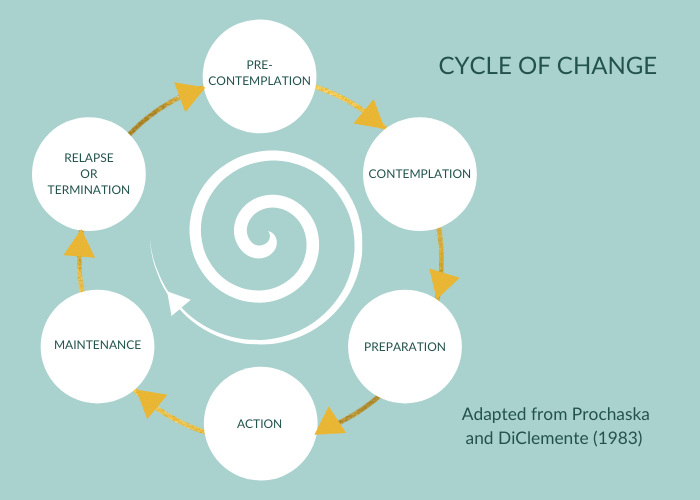
‘By understanding these stages…you can gain control over the cycle of change and move through it more quickly and efficiently, and with less pain.’
Prochaska and DiClemente
Pre-contemplation: Unaware you need to change
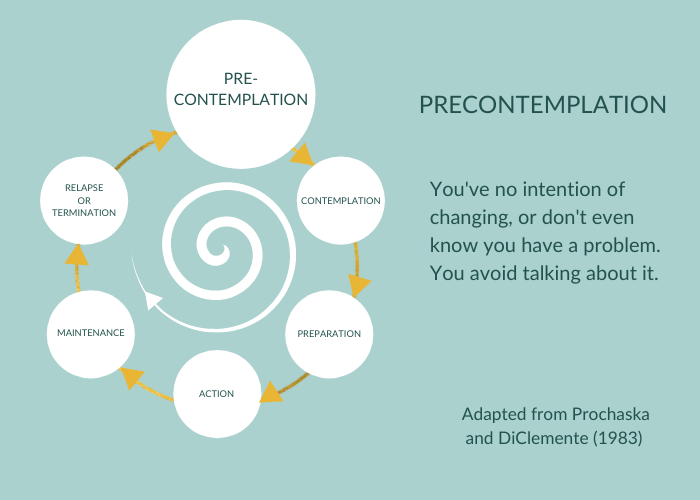
If you’re unaware you have a problem with your eating, you’re at this stage. Most change starts here, though it doesn’t have to. You may be in denial, normalising your behaviour. Have you heard yourself saying things like, ‘everyone indulges themselves at Christmas / during the holidays’ . Okay, there may be some truth in these statements but not all women eat to the degree that it affects their well-being. Once you become aware of your mental tricks, you start to gain control over them.
‘It isn’t that they can’t see the solution. It is that they can’t see the problem.’
G.K. Chesterton
Sometimes people deny they have a problem and go to coaches, trainers or hypnotists regardless. Often they go to placate their spouse or partner. Or to prove that hypnosis won’t work for them. If this is you, it’s very unlikely hypnosis or hypnotic coaching will work for you.
Contemplation: Not yet committed but change is on the horizon
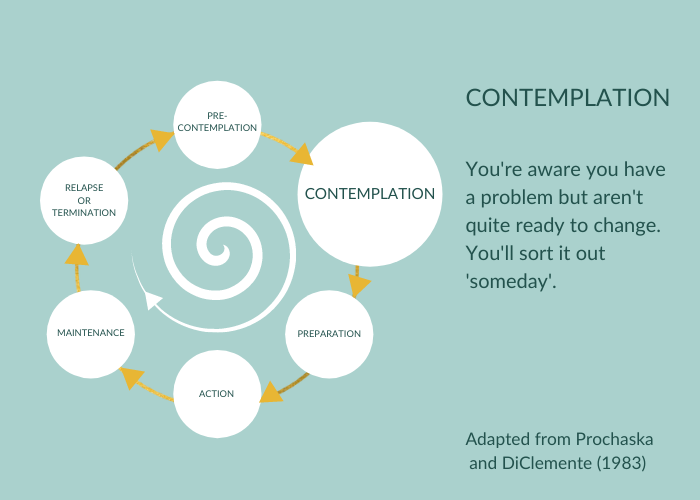
Have you described your situation as feeling stuck? Are you waiting for the perfect moment for change? If so, you might be at the contemplation stage. You’re able to admit you’re binge eating, but don’t understand what’s keeping your problem going. You may have an idea of what action you’ll need to take but you’re not yet committed to it.
There may be a vague kind of plan that you ‘really should stop eating a box of donuts in one sitting’ over the next few months. That’s not the kind of plan that’ll motivate you. It doesn’t tell us how you’ll get you from A to B. I encourage tangible interim goals. You’ve got 12 weeks to prepare for the walking holiday of a lifetime in the most gorgeous location with your family or friends. Or you begin to see your kids replicating your unhealthy eating patterns. That’s real motivation.
Without support, it’s possible to be stuck at this stage for years. But don’t be disheartened. What helps is to start thinking about your future and how you want it to be. Avoid dwelling on your problem. You might’ve heard the expression, ‘What you resist persists’. Hypnosis is powerful because it helps you experience how it might feel to be this best, future self. Until you’ve experienced it, from the inside out, you won’t know how inspiring this can be.
Preparation: Getting ready to stop bingeing
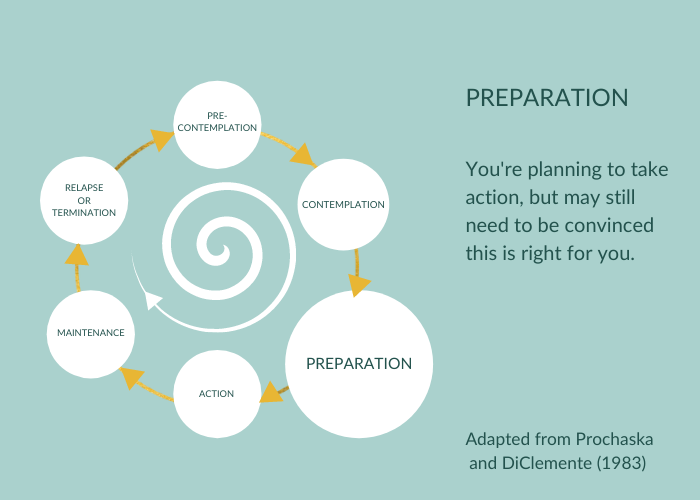
During this stage, you make a commitment to yourself to change. You’ve made your choice and decided to draw a line in the sand. This is when I hear people saying things like, ‘Enough. This can’t go on any longer. I’ve had it with…’. I hear their intent, passion and determination.
Something has to change; it has to be me, and it has to be now.
If this last statement resonates with you, you’ve probably reached the Preparation stage. Each stage of the change cycle has a series of tasks associated with it. Here are 3 of the tasks from the Preparation stage:
1. Publicly announce your decision to make lifestyle changes
Yes, you may need to take a bit of a leap out of your comfort zone here. But you don’t have to announce it on social media or the radio! You can choose to share your decision with a few friends, family members or colleagues. It isn’t necessary to do this but it is more powerful than making a commitment to yourself alone.
2. Get ready with healthy substitutes
Come up with a range of healthy activities you’d like to have in place for times when you feel tempted to splurge. Notice I say, ‘like to have in place’. If these are things you don’t enjoy, (for me, that’s lifting weights at the gym), this won’t be sustainable.
Things that get you moving are good. Or creative outlets like playing the piano or taking photos. I love pottering about in my garden. What will work for you?
I won’t be prescriptive if you invite me along to support you on your journey. My aim, whatever issue you’d like to work on, is to give you back choice. It’s not to replace a situation where you feel you have limited control, with another set of restrictions. Together we’ll come up with the strategies that are right for you.
‘Individuals who believe that they have the autonomy to change their lives are more likely to act successfully than those who are given limited choice.’
Prochaska and DiClemente
3. How to know what information you can trust?
I was a librarian for 20 years so this topic warms my heart. Start to gather information on subjects like nutrition, walking and how to change habits. I know the amount of information out there can be overwhelming and it’s hard to know what you can rely on.
I’m betting that the reason many of you have failed to stop binge eating in the past is you’ve followed the wrong information. This might’ve led you astray, to boot camps, calorie counting, fad diets or slimming clubs that just weren’t right for you.
In my mind coaching programme for binge eating, Attuned, I help women sort the wheat from the chaff. I guide them to quality, reliable articles, books and blog posts. I pick writing that is straightforward and underpinned by up-to-date, scientific research.
Don’t worry if reading isn’t your thing; I also share links to podcasts and YouTube videos.
I’m guessing you’ve not heard of bibliotherapy? Biblio-what, I hear you say. I hadn’t heard the term either until recently. Bibliotherapy (book therapy) means reading books to help you change or heal. Sometimes, just reading certain books is enough to bring about change. (But I’m straying into the topic for another article.)
The good news is you’ve already made a start to your bibliotherapy by reading this article! If you’d like to go deeper into the cycle of change, take a look at Changing for Good by Prochaska and DiClemente (1983).
But be careful not to get stuck in the Preparation phase and delay taking action. This leads us nicely to our next stage.
Action: Changing your behaviour

Create a realistic plan
At last, you get to take action. How will things be different if you begin by making a contract with yourself? That’s right: put it down on paper and sign and date it. Identify an occasion or date for your achievable goal and create a realistic plan by working backwards. People who binge eat tend to be black-and-white thinkers. So make your goal manageable, strive to do well enough, rather than for perfection. You don’t want to risk deprivation propelling your body into famine mode so it programmes itself to store fat.
Make sure all parts of you are aligned
A client once said to me that she was committed to eating more healthily and knew what she needed to do. Then added that she couldn’t understand why she kept sabotaging her efforts. With hypnosis, we were able to answer this question for her and bring any unconscious parts onboard.
It is equally important that your thoughts and beliefs are aligned with your actions. You’ve probably heard the quote attributed to Henry Ford: ‘Whether you think you can or you can’t, you’re right.’ Imagination will always win out over rational argument.
I use Cognitive Behavioural Hypnotherapy, to help women gently challenge any unhelpful thoughts and change them at a deep level. This is a powerful blend of CBT (Cognitive Behaviour Therapy) and hypnosis to address the conscious and unconscious parts of your mind.
Improve sleep and relaxation
It’s about rest as well as action. Research has shown that women who have adequate sleep and manage their stress, are more successful at sustaining a weight that’s healthy for them. If sleep or relaxation is a problem for you, we’ll address this early on so you’ll have a sound, healthy foundation to build on.
Consider your environment
Make any changes to your environment that will set you up for success. For me, this can be buying as often as I can from the local farmers’ market. I’m blessed to have a great one near me and I know not everyone has. When I chat to the wonderful woman who grows the veggies, I’m tempted to try things I’ve not tasted before. Her produce stays fresh for a week—way longer than the veg from the supermarket. I feel inspired to grow more of my own food in my garden and chat to her about my progress. It helps me keep momentum going. Picking up something pre-packed from a country I’ve never visited by a shop that cares more about profits than what we put in our bodies, is way less satisfying.
Seek out the company of people who will support you to change your eating habits. And practice letting people know what it is you need from them. Ask them not to keep encouraging you to eat things you no longer want to.
Go easy on the exercise
Contrary to what you might expect, taking action doesn’t have to involve taking up new exercise. If you’re not used to doing much exercise, this might not be the best time to start. People tend to overestimate how much fat they burn at the gym.
I’m not suggesting you sit on your sofa for the duration of your coaching programme. It’s good for your mental and physical health to move your body. But it is perfectly possible to be healthy without a gruelling exercise regime. Go for walks, swim, do some gardening, whatever movement you enjoy. Now isn’t the time to increase your exercise exponentially: the Maintenance stage is a better time for this.
Maintenance: making your new relationship with food permanent

I often notice this step missing from quick-fix diets and weight-loss programmes. You might already be aware that this stage can be more difficult to achieve than the action stage.
The key is to shift your thinking from ‘being on a diet’ to making a lifestyle change. And be vigilant that you don’t expose yourself to overwhelming temptation before this change has really bedded in. Once your new lifestyle has become second nature, you’ll start to notice that you’ve effortlessly become a healthy eater. It’s now a permanent part of your identity.
Managing stress is important to maintain your new lifestyle. This is why women who work with me take away hypnotic recordings to listen to whenever they need them. And one of the first things they learn is self-hypnosis. I want to equip women with all the tools they need for lasting success.
It’s only sensible to anticipate any stumbling blocks on your horizon. After all, hypnosis isn’t magic and you’re human. We don’t want a weekend away, a wedding, or Easter, to set you on a downward spiral into full relapse. When you rehearse ways of coping in hypnosis, you’ll be able to nip any temporary slips in the bud.
Relapse: a lapse is not a relapse
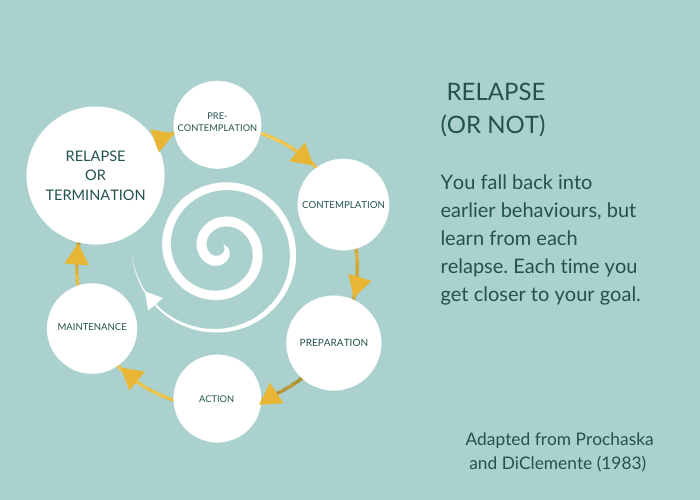
Change can be circular, as you can see from the spiral at the centre of the Cycle of Change diagram above. We’ve all experienced the feeling of taking two steps forward and one backward. The key to finally making lasting change, is to learn from any failures. ‘Fail again, fail better‘, wrote Samuel Beckett. Sound advice.
For lots of women who come for hypnotic coaching, it can feel like the last-chance saloon. Like they’ve tried everything else and failed. If this is you, treasure all this valuable learning. You may now know lots of things you didn’t know before:
- Calorie counting and highly restrictive dieting are replacing one kind of disordered eating with another. And they don’t work in the long term.
- You want help to make the choices that are right for you.
- You wasted money on a gym membership you hardly used and it didn’t have any impact on your eating habits.
- It’s impossible for you to get your eating habits under control until your stress has become manageable. And until you can have compassion for yourself.
- You’d like support and someone to cheer you on, so you don’t feel isolated.
Can you use this self-knowledge to choose a better way for you to take charge of your eating now?
What’s the next step?
Would you like to learn more about getting my support to use the right strategy at the right time to stop binge eating for good?
Are you interested in learning more about my hypnotic coaching programme, ‘Attuned‘?
Would you like a chat to tease out which stage you’re at on your journey to stop binge eating?



